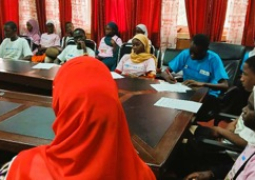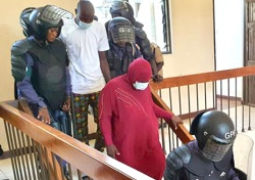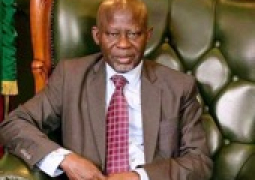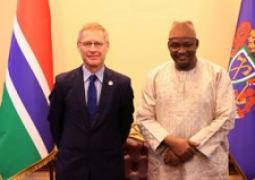
The former British colonial settlement was founded in 1823. It’s the only town in the country which has three names: Janjangbureh, George Town and McCarthy. Inhabitants of the area mostly young people get their income through tourism.
However, many young people who were working in the hotels in the Island were laid off and some tour guides in the town were also forced to venture into some other businesses as tourists were not forthcoming due to the covid-19 pandemic. Since the country registered the first coronavirus case on March 17th 2019, the pandemic has affected the health, economy and other sectors of the country leaving many people jobless.
Lamin M.B. Keita, commonly known as “Taka Titi” who is a traditional communicator and a local tour guide in the Island, said: “The covid-19 pandemic has really affected our work as tourists were not coming to the Island. Tourism benefits everybody in the town, especially lodge owners, restaurant owners and even the women vendors and the tour guides.”
During tourists’ season, he said, tourists that usually come to the town are taken on guided tour to visit historical sites in the Island ranging from the Slave House to the Freedom Tree among other places.
“However, when the pandemic hits, all of us were handicapped. I can tell you that 60% of my income was from tourism. I was earning a little income during the pandemic, and therefore it became difficult for me to sustain my family. We were badly stranded because there were no gatherings. As drummers, we didn’t find other alternatives to entertain people.”
“When the tourists’ season gets better, I make about D10, 000 to D20, 000 a month. However, I got less than D2000 a month during the pandemic. Most of the money I get comes entertaining tourists who usually visit the Island,” he explained, claiming also that he only receives D1200 from the government as a means to support the local tour guides in the town.
Banna Kongira, a hotel owner in the Island, said: “The pandemic has really affected us. We even find it difficult to have guests at our hotels. In fact, sometimes the only guests we have are civil servants. These are people who will be on trek and they would spend only two or three nights.”
“I have to lay off two of my staff due to the economic impact of the pandemic. I couldn’t maintain them because revenues were not coming. I have to volunteer to be a cleaner and at the same time be the manager. If I should have paid staff with the little income I was having, then I would have been left with nothing,” he pointed out.
“I was even forced to reduce the amount I was charging per night. So, we make a discount for travellers who don’t have vehicles and wish to spend the night in the hotel.”
According to him, before the coming of the virus he made about D15, 000 to D20, 000 a month, claiming that during the pandemic he sometimes gets less than D5000.
“I also tried and made a business plan with a boat owner. I joined with him in order to have something at the end of the day with a view to support my family and also get a little income and renovate my hotel. We were ferrying people from Janjangbureh ferry crossing point to the other side of the river,” he added.
The Gambia Tourism Board, he explained, also supported them with D50, 000. “These really helped me so much. I will use some of the money to renovate my hotel and also support my two staff that was laid off.”
Abdoulie Sidibeh a guard at the Slave House in Janjangbureh, said: “Restaurant owners, local tour guides and even hotel owners were hit hard during the pandemic. In fact, we were left with no other option but to venture into businesses. Some local tour guards in the town have to venture into selling firewood among others,” he said, adding that they didn’t receive any financial support from the government.
“The little resources we get from tourists who visit the Slave House is what we use to renovate some historical places in town,” he stated.
Abba Sanyang, the regional governor of CRR, said the economic impact of the virus in the region was huge. However, he was quick to add that the government has supported Gambians in many ways especially with feeding and others, claiming that Janjangbureh also benefitted from the gesture.
“Vulnerable institutions that were directly or indirectly affected by the pandemic were supported by government with a view to overcome their challenges. As we are speaking at the moment, there are NGOs that are coming through the government to support families in the region and also engage them into several other economic activities.”
This story was produced with support from Journalists for Human Rights (JHR), through its Mobilizing Media in the Fight Against COVID-19 in partnership with Mai-Media and The Point Newspaper.





